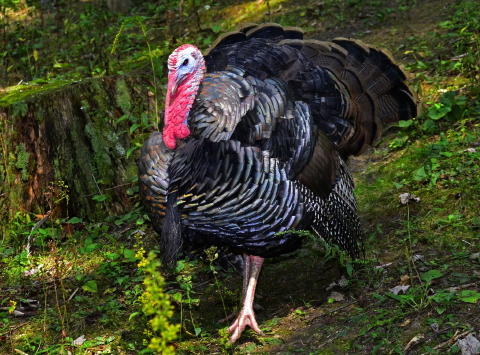
SOUTH CHARLESTON, W.Va. - Spring gobbler season opens in West Virginia Monday, April 27 and runs through Saturday, May 23. Hunters may kill only one bearded turkey per day, but they are allowed two per season. Youth season for hunters at least 8 years old and less than 18 years old will be held Saturday, April 25.
Hunters must use the new electronic game checking method for reporting their harvested birds. Hunters may use the telephone option by calling 1-844-WVCheck after obtaining their Division of Natural Resources ID number. Hunters without a DNR ID number may visit www.wvhunt.com or any license agent to get one. For more information, consult page 35 of the 2014-2015 West Virginia Hunting and Trapping Regulations.
Annual license buyers will find their DNR ID number in the upper left hand corner of their license. Lifetime license holders and hunters not required to purchase a license (landowners and youth, for example) may obtain their DNR ID number by visiting www.wvhunt.com or a license agent and verifying their information.
Since the typical gobbler harvested is usually a 2-year-old bird, the DNR routinely uses the brood reports from two years prior to estimate harvest trends. On a statewide level, the 2013 brood reports were slightly lower than the five-year average, indicating that the statewide harvest may be reduced.
Regional variations in the data, however, give hunters in the western and central mountain regions hope for a better season because brood reports were almost double from the year before. In addition, the excellent mast conditions from the 2014 acorn crop will have turkeys in peak physical condition for breeding activities.
"As spring progresses, many hunters quit hunting for a variety of reasons, including a perception that the birds have finished gobbling," according to Keith Krantz, Wild Turkey and Upland Game Biologist for the DNR Wildlife Resources Section. "Obviously, those highly vocal turkeys that are more prone to come to calls are taken during the first week of the season, which generates 58 percent of the total harvest.
"Good-to-excellent hunting, however, can still be had through the end of the season," Krantz said. "With spring in full bloom at that time, it is more difficult to hear and be heard by a gobbler. Some of the best hunts take place in the last two weeks of the season as hens begin incubating eggs and gobblers are easier to call into shotgun range."
"Hunting turkeys over bait is both illegal and unethical in West Virginia. This activity disrespects the great sport of spring gobbler hunting," Krantz said.
Turkey hunters are encouraged to report any such activity to their local Natural Resources Police Officer. The West Virginia Chapter of the National Wild Turkey Federation pays a reward of $100 for information that leads to the arrest and conviction of persons attempting to kill wild turkeys through the use of bait.
| 


